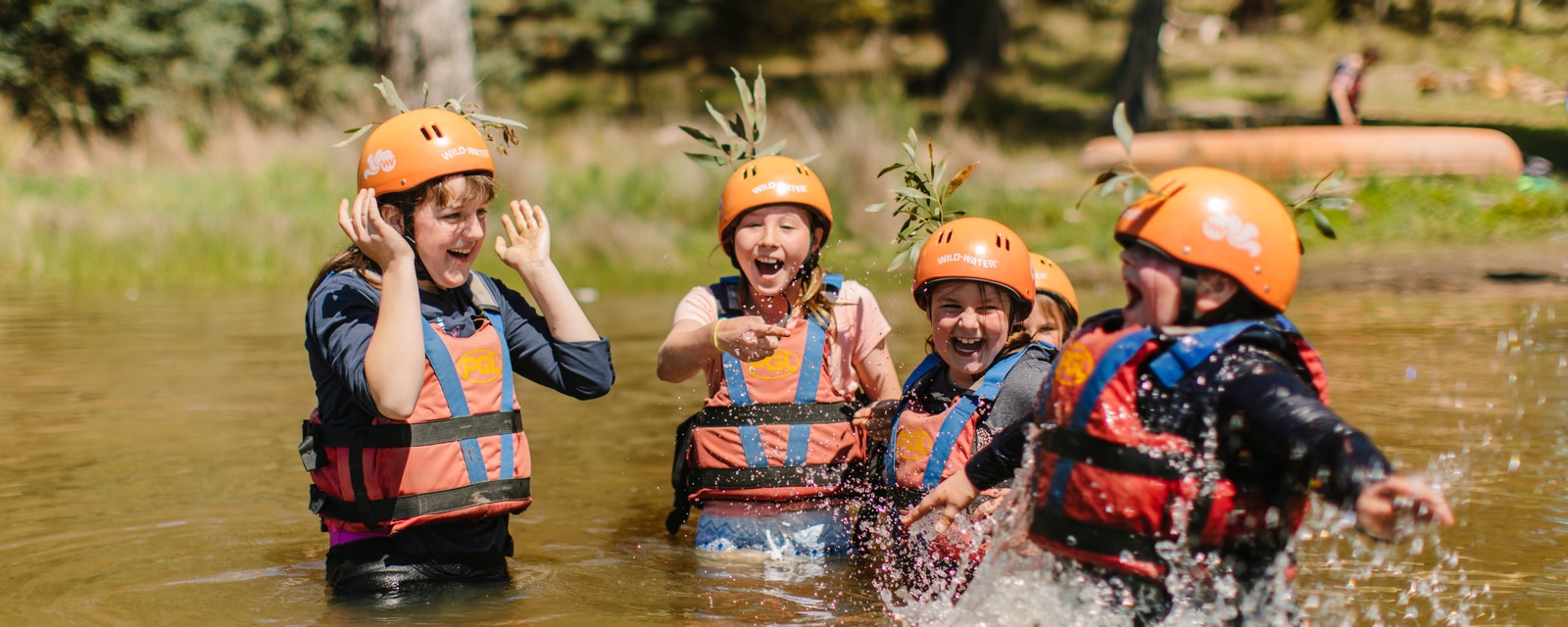Building resilience in kids is essential for their personal growth, helping them to navigate their fears, overcome challenges, and manage expectations both in school and in everyday life with confidence.
As part of our R.E.A.C.H Framework, we believe the great outdoors has the power to inspire breakthroughs and support children in their journey of self-discovery. That’s why adventure camps provide the perfect environment for kids to learn, grow, and, most importantly, become resilient!
In today’s blog, we’ll explain what resilience is, how adventure camps foster it through a range of fun outdoor activities, and share a few tips for parents on how they can help their children build resilience at home.
What is resilience?
Resilience is the ability to manage life’s setbacks and obstacles with a positive mindset. In essence, it’s about developing the inner strength to adapt, persevere, take risks and try new things—even if they seem daunting or scary at first.
Children need to learn how to handle their emotions and stress in a healthy way. Resilient kids are more likely to embrace new challenges, communicate well with others, persist through failures and grow into adaptable, self-assured individuals.
Why adventure camps are great for building resilience in kids
But resilience isn’t something we are born with—it’s a skill that needs to be nurtured. Enter adventure camps! From team building exercises to opportunities for socialisation, there are countless ways for kids to push their limits and thrive!
Let’s take a look at how camps like PGL develop a resilient mindset that will benefit them for years to come.
Improve social resilience
We’ve all been knocked down by a failed friendship before, right? Well, adventure camps help kids get past the fear of overcoming social difficulties by encouraging them to connect with their peers. Whether it’s a challenging initiative exercise, these activities are fantastic for improving kids’ communication and listening skills.
The more they get to know each other, the more comfortable and confident they become in building new friendships. Additionally, interacting with a diverse group of people can help to broaden their perspectives, turning them into well–rounded individuals.
Promote independence
Away from the comforts of home, adventure camps place children in a new, unfamiliar environment where they must learn to rely on themselves and tackle problems on their own, without immediate help from parents.
The good thing is that these challenges at camp aren’t anything major. For example, simple tasks like making their bed, managing their own time, or even deciding what to wear for the day’s activities contribute to their growing sense of independence. This newfound responsibility empowers them to make their own choices, which is key to building resilience in kids.
Create a strong identity
At adventure camps, children are often removed from the pressures of their usual social circles. This allows them to cultivate a strong identity by stepping outside of their comfort zone and discovering different aspects of themselves.
Luckily, there are plenty of fun-filled activities such as canoeing or shelter building to help kids not only develop new skills but also uncover hidden talents and interests they may not have realised before. Over time, children gain a deeper understanding of who they are, embrace their unique traits and take pride in their own achievements.
New challenges
Around every corner is a new challenge in life, and that’s exactly what adventure camps help children prepare for. Whether it’s greater independence as we mentioned before, or overcoming physical and mental barriers during activities, these kinds of experiences can really help with building resilience in children.
An obstacle course, for instance, requires campers to use problem-solving, lateral thinking and coordination to navigate through, testing their ability to think on their feet and work well as a team. Meanwhile, abseiling challenges kids to step over the edge and ascend down a tall tower. This determination can be a massive confidence booster and reinforces that they must face their fears head-on.
Resilience building activities for kids at PGL
Our wide range of exhilarating outdoor activities are designed to motivate, increase confidence and help kids make new connections
At PGL, we have a wide variety of resilience building activities for campers to enjoy. The overall PGL experience is geared towards helping kids build confidence, resilience, and independence. With exciting activities and new challenges every day, they’ll gain valuable skills while having a great time!
Here are some activities that are great for building resilience in kids:
Abseiling:
Participants climb to the top of a tower, harness up and carefully descend under the guidance of trained instructors. Stepping off the edge takes courage and it teaches kids to trust the process (and themselves) as they overcome their fears step by step.
Archery:
Ready, aim, shoot! That’s the aim of this activity. Kids learn how to handle a bow and arrow safely while improving their shooting accuracy. Not every arrow will hit the target, but they will quickly learn the importance of practice, patience and persistence.
Bush Craft:
Master essential survival skills like shelter-building, water filtration, knot craft, and fire lighting! This hands-on adventure builds resilience as kids work together to tackle outdoor challenges and adapt to the bush.
Centipede:
Work in sync as a team to tackle a series of suspended obstacles while staying connected —just like a centipede! To succeed, kids must learn to communicate effectively and adjust to their movements to keep moving forward, developing resilience along the way.
Challenge Course:
One of our most popular resilience-building activities, this dynamic obstacle course challenges kids to climb obstacles, balance on ropes, and crawl through tunnels. It pushes their limits while building confidence, grit, and a “can-do” attitude!
Climbing:
Build confidence with every climb! Whether using an auto-belay or a ‘ground up’ belay system, kids develop grip strength, balance, and technique as they navigate different wall surfaces—learning to persevere through slips and setbacks.
Initiative Exercises:
Plan, make decisions and communicate effectively as groups work together to complete several mental challenges, some of which may also require some physical ability. This is perfect for developing critical thinking, adaptability, and collaboration.
Mud Run:
A wild, muddy adventure packed with exciting challenges, teamwork, and non-stop fun! This unpredictable course encourages kids to embrace the mess, push through obstacles, and support each other to the finish line.
See our activities page for a full list and description of our epic activities.
Resilience building tips for parents and teachers
As parents and educators, we play a key role in equipping kids with the skills they need to thrive in life. When children can bounce back from setbacks, they’re better prepared to handle life’s obstacles.
The good news is that resilience is something we can foster not just at adventure camps, but also at home and in school! Here are some practical ways to help kids develop resilience:
1. Let them make mistakes
Sometimes kids make mistakes, and that’s okay. It’s a natural part of the learning process and we should encourage children to see errors as opportunities for growth, rather than something to be ashamed of. Help them analyse what went wrong, what they can learn from it, and how they can approach the situation differently next time. This helps to reduce the fear of failure and encourages a more positive mindset.
2. Foster a growth-mindset
As mentioned before, it’s important that we praise progress over just results. By emphasising that abilities can be developed through dedication and hard work, kids will be much more motivated to keep trying, even when things get tough. Use phrases like “I can see how much you’ve improved since you started practising”, or “You’re getting better every day—keep it up!” Ultimately, it reinforces the idea that effort leads to growth and success.
3. Acknowledge their feelings
Validating children’s emotions is crucial, even if you don’t agree with their perspective. Say things like, “I understand you’re feeling frustrated,” or “It’s okay to feel sad sometimes.” For example, if a child is struggling with a difficult math problem in class or feeling upset because a sibling took their last snack, acknowledging their emotions helps them feel heard and understood.
4. Teach emotional regulation
Help children develop healthy coping mechanisms for managing their emotions. Teach them techniques like deep breathing, mindfulness, or taking a break when they’re feeling overwhelmed. Identifying their triggers can also be helpful, allowing them to recognise and approach difficult situations with a calmer, more thoughtful response.
5. Encourage them to ask questions
Finally, encourage your children or students to ask questions, even if they seem “silly” or “obvious.” Create an environment where they feel comfortable expressing themselves openly, seeking knowledge and exploring new ideas without judgment. This fosters a lifelong love of learning and strengthens their problem-solving skills.
Build resilience with PGL!
Now you know why adventure camps are fantastic for building resilience in children, why not check out our holiday camps for kids? We offer both Summer camps and Winter camps for 8-14-year-olds at PGL Kindilan (QLD), packed with fun, new friends, and exciting skills to learn during the school holidays!
For teachers, you can book your learners onto one of our school camps which include primary school camps and secondary school camps, located at Campaspe Downs (VIC), Camp Rumbug (VIC) and Kindilan (QLD). You can also check out our R.E.A.C.H Framework programs: DISCOVER!, UNITE!, GROW! And MASTER!) designed to focus on a selection of education outcomes.
Your group is at the heart of what we do at PGL. We put safety first with 100% instructor-led activity sessions, which also allows you to bond with your students rather than running the sessions yourself, as you usually would in the classroom. Your PGL groupies are also always available for any questions you or your students may have, just ask!
Why not contact us today and we’ll be on hand to help arrange a fantastic adventure camp for your children or students!








